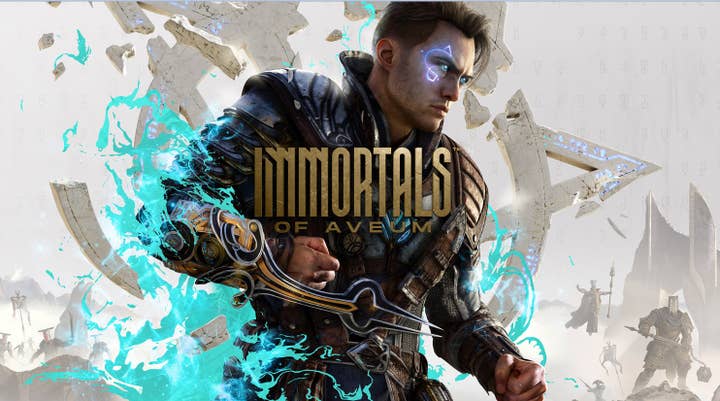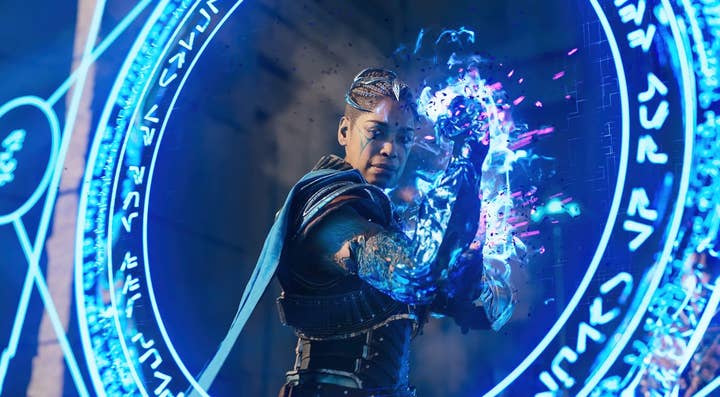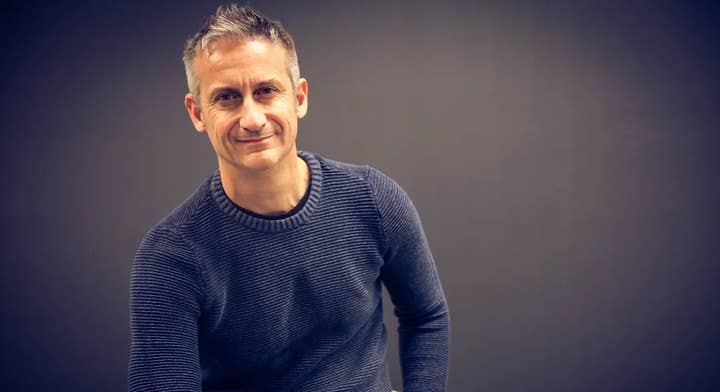"The Immortals of Aveum story isn't written yet"
Ascendant Studios on the 'failure' of its debut game, what went wrong, and why it's not over yet
In Europe, Immortals of Aveum was the 469th best-selling game of 2023.
Now, No.469 isn't necessarily a bad spot. If you're a small developer making a game on a tight budget, 469th position could be perfectly profitable.
Immortals of Aveum was not made by a small developer. It was not made on a tight budget. It is a AAA fantasy shooter created by a 100-person dev team, led by a former Call of Duty creative director and published by EA. No.469 was not perfectly profitable. And a month after the game was released, developer Ascendant Studio laid off 40 employees.
Not every game can be a hit. When you take a gamble on something new, it might not pay off. Immortals of Aveum isn't the first AAA game to miss, and it won't be the last. Yet what's different this time is that studio founder Bret Robbins wants to talk about it.
"It was a murderer's row of big games"
"You learn more from failures and mistakes than successes," he begins. "People should hear all sorts of stories, not just about the huge breakaway hits, but also when things don't go so well. And that doesn't mean they're not good, and it doesn't mean that story shouldn't be told."
So what went wrong?
"When we were heading to launch, we knew it was very crowded," he says. "This was a very unusual year. Zelda had come out, Star Wars Jedi: Survivor was a little before us. And as we were nearing launch, Baldur's Gate 3 suddenly blew up right in front of us. That one, more than any of the others, seemed unanticipated.
"We knew we had Armored Core 6 the same week, and we were worried about that. And Starfield was like ten days after us. We were sandwiched between a lot of different big games, or games from really big studios. We absolutely got lost in the noise. And that was unfortunate, because we pushed the date out a bit in order to get a good polish pass done, to get performance better [it was originally due July 20, but launched August 22]. Although the game was better, the timing was worse."

Baldur's Gate 3 was initially due at the end of August on PS5 and PC, but Larian pushed the PC version forward a month, putting it ahead of Immortals of Aveum. The RPG was always expected to sell well, but nobody had quite anticipated the level of success it would go on to have.
2023 was a year filled with these games that sucked the oxygen out of the market. The sort-of titles that dominate column inches and social media. There was Hogwarts Legacy in February, Zelda in May, Diablo in June, Baldur's Gate in August, Starfield in September, and then Assassin's Creed, Spider-Man and Mario in October. Then in-between all those, you had titles like Star Wars, Resident Evil, and Final Fantasy vying for attention. Ascendant wasn't the only company struggling to find a space for its game.
"It was a murderer's row of big games, and we are a new studio, people didn't know who we were," Robbins says.
"There are some questions around whether our marketing was targeting the right people or not. We just didn't raise the awareness we needed."
Could they have pushed the game even further out?
"You just don't know what is going to happen," Robbins answers. "Maybe we could have moved to February 2024…. and then suddenly Helldivers 2 eats our lunch."
Robbins adds that launching a new IP, having previously worked on Call of Duty, was much harder than expected.
"Just the creation of the game is very challenging. You’re not drafting off the work of other games. When I used to work on Call of Duty, from day one we had loads of systems, code and assets, and a legacy of game design behind us. You had those headwinds behind you, let alone the popularity of the sales. We didn't have any of that. We had to imagine and design every piece of it. That alone is a tall order. Then the reaction in the market to new IP is very difficult.
"One thing that surprised me is that the critical consensus was all over the map. I've never worked on a game that got both 4s and 10s. And I think that can be attributed, to some degree, to it being a new IP. You don't have a consensus going into the game of what people think it's going to be. On Call of Duty, I never had that experience. People knew what Call of Duty was, a lot of the time the journalist reviewing the game was already a Call of Duty player, so there was a certain buy-in.
"We were a fantasy shooter, and we clearly got some reviewers who don't like shooters. Maybe they were surprised by it. New IPs face that. People are going into it blind. Some people are not going to like it, some people are going to really like it. We were fortunate that a lot of people really liked the game, but it was much more polarising than I thought it would be."
"The critical consensus was all over the map. I've never worked on a game that got both 4s and 10s"
Immortals of Aveum was broadly well received. Critical reception varied, but fan reaction was generally positive, with user scores ranging from 75 - 86% across the various stores. But awareness was the problem, Robbins says. Although the game shared similarities with titles like God of War and Doom Eternal, that didn't necessarily come across, and he recalls that players were confused when the initial trailers dropped.
And for those fans who were aware of the game, Robbins found they typically responded in two ways.
"It was either: 'It looks cool, I'll play it when it's on sale' or 'It looks cool, I'll play it when I have time.' And we've found that to be true. When we did go on sale in November, and when the huge breakout games started to quiet down a bit, suddenly we had five times the sales that we had earlier. And that's testament to the fact that people were now discovering it and had the time to play it."
Indeed, Immortals of Aveum is far from a hit, but things have improved. The bulk of its sales have come between November and January thanks to a 50% discount and the release of new content. EA ran a free trial, and the number of people who went on to buy the full game is three times higher than what the publisher typically sees. All of which bodes well, Robbins says.
"We are still here, we are still supporting it, the sales are picking up and I hope more and more people play and enjoy it."
He continues: "The story of Immortals isn't written yet. I was the creative director on Dead Space, and people were discovering that for years and years. I think Immortals will be the same."

The game was certainly a major undertaking, and a costly one. In an IGN article featuring people impacted by the recent layoffs, one former Ascendant employee said the game had an $85 million development budget.
Immortals was commissioned, and the studio formed, during a time of high investment in new teams. Investors weren't interested in small scale indie projects but were seeking something substantial. Robbins couldn't confirm what it cost to make, but noted that Ascendant built the game on a budget far below its rivals.
"Our ambition was to make a AAA game, and AAA games cost a lot to make," he admits. "And the competition is extremely fierce. You have games that have been around for 20 years doing their seventh, eighth, ninth version. It was a decision between myself and my investor to go big and take a big risk, with the hope of creating something original. You do hear players talk a lot about wanting new experiences. We all need that in the industry. It was a matter of taking the money that we have, doing the best possible job we can, as efficiently as we can.
"For a big AAA game, our budget was pretty modest. We delivered an amazing 25-hour game that's beautiful and plays really well, and was relatively bug free, and at half the cost or less of a lot of these bigger games… certainly compared with the games I've worked on."
Robbins adds that the game is "100% AAA" and that it is something his peers in the industry has recognised.
"That is a real testament to the team. I'm proud of what we did. The reaction to the rumours of the budget might be more about… these games cost a lot to make. They're hard to make and take a lot of time. Immortals took five years. And If you sat down and played Immortals, you'd be playing a AAA game."
"For a big AAA game, actually our budget was pretty modest. We delivered an amazing 25-hour game [...] at half the cost or less of a lot of these bigger games"
Ascendant continues to update the game, and Robbins says the team is now building another internal title. It's also eyeing other projects, although he's not at liberty to disclose what they are and who the partners might be.
"We have put ourselves on the map," he says. "You can probably count on one hand the number of independent AAA studios. There are not many of us. We've made a name for ourselves by putting something out that was good quality."
The games industry is going through a tough time, although what's happened to Ascendant is less about the macroeconomic or investment landscape, and more a simple case of taking a swing and missing.
That doesn't mean it hasn't had to contend with the wider market dynamics. Indeed, Robbins observed that hiring staff during the pandemic brought unique challenges that can still be felt today.
"During the pandemic, because everyone was remote, you were suddenly dealing with a global, or a country-wide, hiring market," Robbins reminds us.
"When it was local, we could only really hire around the Bay Area. Suddenly we could hire everywhere, but so could everyone else. The competition for jobs across the world expanded in this crazy way. In order to attract great talent, you had to pay well, and we still do. That's hard, and we can see a lot of companies that did that are now having to lay people off, because they can't sustain it."
Robbins is positive about the market. He noted that 2023 was encouraging in terms of the quality of the games and the sheer number of people playing them.
"We are creating great games, people are buying and playing them… at the end of the day, that's all that matters," he says, before acknowledging that the current situation in terms of redundancies "really sucks."
"If people want new IP, if they want innovation, they have to vote with their wallet"
Admittedly, a lot of the big games last year were sequels, or new titles from very established studios. And Robbins is wary of a market too reliant on the next big franchise release.
"If people want new IP, if they want innovation, they have to vote with their wallet," he says. "If you say it and don't buy it, maybe you don't believe it that much."
Ultimately, he concludes, it may not have been the start they wanted, but Ascendant is still standing. Its story isn't over yet.
"Our story is very simple," he concludes. "We didn't sell enough games. If you don't sell enough games, you don't have enough revenue and that's a big problem when you're running a business.
"If you look at the journey of most companies, even the huge ones, it's usually a crooked path. How many times did someone like Amazon almost go bankrupt? Our story is just starting. Immortals was chapter one for Ascendant. And we'll keep having more chapters."









